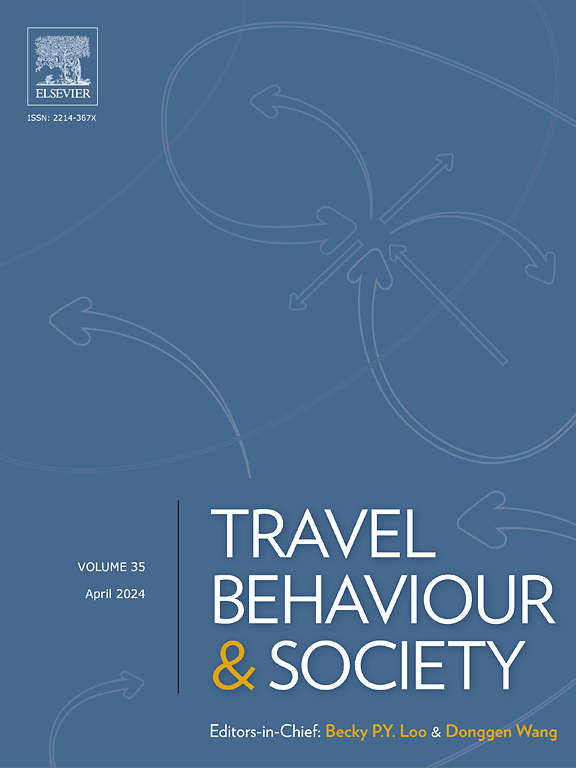Modeling battery electric vehicle users’ charging decisions in scenarios with both time-related and distance-related anxiety
IF 5.7
2区 工程技术
Q1 TRANSPORTATION
引用次数: 0
Abstract
As one of the most promising alternatives to internal combustion engine vehicles, battery electric vehicles (BEVs) have become increasingly prevalent in recent years. However, range anxiety is still a major concern among BEV users or potential users in recent years. The social-psychological factors were found to be associated with range anxiety, but how the charging decisions are affected by range anxiety is still unclear. Thus, in our study, through an online questionnaire issued in mainland China, we collected 230 participants’ charging decisions in 60 range-anxiety-inducing scenarios in which both distance-related, and time-related anxiety co-existed. Then, an interpretable machine learning (ML) approach with the Shapley Additive Explanations method was used to model BEV users’ charging decisions in these scenarios. To further explore users’ decision-making mechanisms, a Bayesian-Network-regression mixed approach was used to model the inner topological structure among the factors influencing users’ decisions. We find that both time-related and distance-related factors can affect users’ charging decisions, but the influence of waiting time is softer compared to the BEV range. Users’ charging decisions can also be moderated by users’ psychological states (i.e., range anxiety level and trust in range estimation system), individual differences (i.e., age and personality), and BEV using experience (i.e., driving mileage, display mileage and range estimation cycle of range estimation system), of which, the range anxiety level is more directly related with users’ charging decisions. Findings from this study can provide insights into the optimization of charge station distribution and customization of the charging recommendation system.
基于时间焦虑和距离焦虑的纯电动汽车用户充电决策建模
纯电动汽车(bev)作为内燃机汽车最有前途的替代品之一,近年来得到了越来越广泛的应用。然而,里程焦虑仍然是近年来纯电动汽车用户或潜在用户关注的主要问题。社会心理因素与里程焦虑有关,但里程焦虑对充电决策的影响机制尚不清楚。因此,在我们的研究中,我们通过在中国大陆发布的在线问卷,收集了230名参与者在60种距离焦虑和时间焦虑并存的里程焦虑诱导情景下的充电决策。然后,使用Shapley加性解释方法的可解释机器学习(ML)方法对纯电动汽车用户在这些场景下的充电决策进行建模。为进一步探索用户决策机制,采用贝叶斯-网络-回归混合方法对影响用户决策因素的内部拓扑结构进行建模。我们发现,时间相关因素和距离相关因素都会影响用户的充电决策,但等待时间的影响相对于纯电动汽车里程的影响要弱一些。用户的充电决策还可以受到用户心理状态(即里程焦虑水平和对里程估计系统的信任)、个体差异(即年龄和性格)和纯电动汽车使用经验(即行驶里程、显示里程和里程估计系统的里程估计周期)的调节,其中里程焦虑水平与用户的充电决策关系更为直接。研究结果可为充电站布局优化和充电推荐系统定制提供参考。
本文章由计算机程序翻译,如有差异,请以英文原文为准。
求助全文
约1分钟内获得全文
求助全文
来源期刊

Travel Behaviour and Society
TRANSPORTATION-
CiteScore
9.80
自引率
7.70%
发文量
109
期刊介绍:
Travel Behaviour and Society is an interdisciplinary journal publishing high-quality original papers which report leading edge research in theories, methodologies and applications concerning transportation issues and challenges which involve the social and spatial dimensions. In particular, it provides a discussion forum for major research in travel behaviour, transportation infrastructure, transportation and environmental issues, mobility and social sustainability, transportation geographic information systems (TGIS), transportation and quality of life, transportation data collection and analysis, etc.
 求助内容:
求助内容: 应助结果提醒方式:
应助结果提醒方式:


